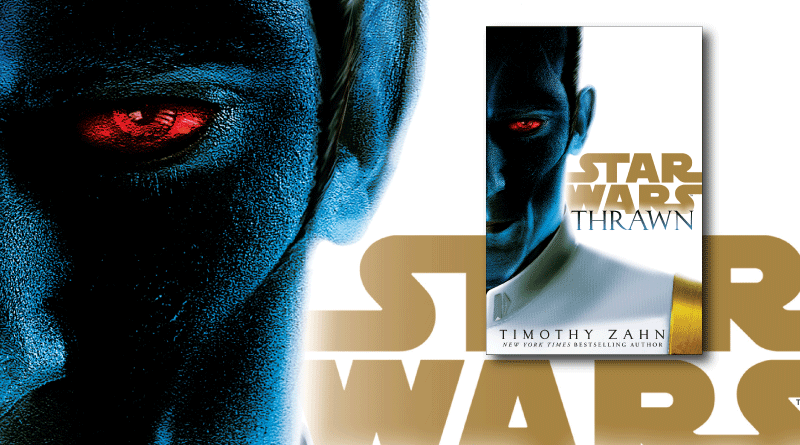Timothy Zahn on Thrawn
 This interview really doesn’t need an introduction: at Celebration Orlando I had a chance to chat with Timothy Zahn — Hugo winner, New York Times best-selling author — about one of Star Wars most iconic villains. With the original Thrawn trilogy on NPR’s list of Top 100 Science-Fiction Fantasy Books, Grand Admiral Mitth’raw’nuruodo returned to canon in Rebels and in Zahn’s recently released novel, Thrawn.
This interview really doesn’t need an introduction: at Celebration Orlando I had a chance to chat with Timothy Zahn — Hugo winner, New York Times best-selling author — about one of Star Wars most iconic villains. With the original Thrawn trilogy on NPR’s list of Top 100 Science-Fiction Fantasy Books, Grand Admiral Mitth’raw’nuruodo returned to canon in Rebels and in Zahn’s recently released novel, Thrawn.
What really differentiates Thrawn from the Thrawn novels of Legends is that for the first time, we are given Thrawn’s perspective in the form of journal entries at the beginning of each chapter and by his perception of those he meets. But Thrawn’s insights are varied and interesting — and not only in a Galaxy Far Far Away.
As a physician, I loved that Thrawn endorses exercise:
“The mind and body are linked together in a meshwork of oxygen, nutrients hormones and neuron health. Physical exercise drives that meshwork, stimulating the brain and freeing one’s intellect.”
I couldn’t agree more.
When I expressed to Tim my anxiety about Thrawn’s future in Rebels, Tim said to me, “Courage.” And here is Thrawn’s own advice, no matter what happens to him:
“A friend need not be kept either within sight or within reach. A friend must be allowed the freedom to find and follow his own path. If one is fortunate, those paths will for a time join. But if the paths separate, it is comforting to know that a friend still graces the universe with his skills, and his viewpoint, and his presence.
For if one is remembered by a friend, one is never truly gone.”
Did I out-Thrawn Zahn in question 1? Read for yourself and decide.
- “All beings begin their lives with hopes and aspirations. Among these aspirations is the desire that there will be a straight path to those goals. It is seldom so. Perhaps never.” Right from the opening lines of Thrawn, you play on the meaning of his name, which means “crooked or twisted,” and you continue the theme throughout the novel. Is it a reference to Thrawn’s long journey from Heir to the Empire to Thrawn and into Star Wars canon? Or is it a more personal reflection about life’s twists and turns? What inspired the topic for you?
To be honest, I never made the connection between that journal entry and Thrawn’s name. (Clearly, my subconscious is smarter than I am.) It was really just something gleaned from six decades of watching people’s lives – including my own – and how plans and expectations often end up going in unexpected directions.
- Grand Admiral Thrawn was introduced in Heir To The Empire in 1991, twenty-six years ago! That’s a long time to know someone; did that make writing from Thrawn’s point of view easier or more difficult? Has time and perspective changed Thrawn as a character for you?
I actually resisted the idea of doing any of the book from Thrawn’s point of view. As an alien, his thought process should be different than humans; but if the differences are too great we risk losing the readers or at least snapping them out of the story. It took several tries before we got to the pattern that ended up in the book.
And no, my perception of Thrawn hasn’t really changed over the years, except in that my overall understanding of people and the world in general has deepened over that time.
- What has it been like to reintroduce Thrawn for a new generation?
It’s been a real treat. Thrawn is so unlike any other Imperial officers we’ve met in the GFFA that he immediately stands out. Those who saw him for the first time in Rebels will hopefully be intrigued enough to read the book and get a deeper insight into him and his character, as well as seeing more of him in action.
- Were there any aspects of Thrawn that were particularly fun to revisit, like the short story “Mist Encounter” about how Thrawn meets the Imperials? (I personally loved seeing Voss Parck again.) Were there any aspects that were hard to release?
Tweaking “Mist Encounter” to put Eli into the thick of the action was fun – I’ve always liked that story and Thrawn’s tactics as he runs the Imperials in circles. Since I was writing him in a hitherto untouched part of the timeline (untouched by me, anyway – some of the old games had visited him in that time period), there really wasn’t anything I had to let go of or overwrite.
- The events of Thrawn dovetail closely with Rebels and shed light on some of Thrawn’s more seemingly surprising actions on the show, like when he appears to lose his temper and yell at Lieutenant Lyste. What was it like to see Thrawn come alive onscreen? Is he how you’ve pictured him in your head?
I don’t see my characters in terms of voice or appearance, but rather as personality or attitude. That said, I very much enjoyed the way the Rebels team brought him to life, in his appearance, voice, and actions.
I also appreciated the freedom I had to tweak certain incidents, such as the one you mentioned, and give additional or alternate explanations for the viewers who may have thought those were somewhat out of character for him.
- I have three favorite passages from Thrawn’s journal entries. (The other two are in my introduction.) Of the three, this one, about art, really stood out, when Thrawn says: “Artists were individuals. But they were also products of their culture and history and philosophy. The weave of artist and culture was evident to the discerning eye. The fundamental pattern of a species could be sketched, then drawn, then fully fleshed out. Most important of all, the relationships among art, culture, and military doctrine could all be deduced.”
To your discerning eye, what do you think it says about us as a fan culture, as a reflection of our art, that Thrawn, despite being a villain, is so beloved?
I think he’s beloved for a couple of reasons. First, because the readers can understand why he’s chosen the Imperial side of the great galactic struggle, and can therefore sympathize with him on a certain level. Second, the heroism of the heroes is measured by the villainy of the villain, and a smart, competent villain forces the heroes to bring their A-game to the field. That makes for a more interesting, exciting, and dramatic story.
- Thrawn follows the lives of a few different Imperials: we follow Thrawn’s aide, Eli Vanto, his separation from his family’s expectation for his career as he matures into a command officer. As we follow Arihnda Pryce, we understand what motivates her and the basis for her bitterness. The lives of Imperials seems so isolated, in contrast with Thrawn’s observation in Rebels that the Rebellion relies on friendship. Is that a contrast you wanted to make in the novel?
Indeed. The final fatal flaw of all evil is that it is fundamentally selfish, and as such can never trust anyone else enough to form any true alliance, or at least can’t maintain any such cooperation beyond the point where one party sees benefits in betraying the others. Friendship, trust, and loyalty are what binds the Rebellion together, and ultimately brings them victory.
I’ll also note in passing that Thrawn’s ability to inspire loyalty among his troops is one of the things that makes him unlike most Imperial officers, and hence more dangerous to Our Heroes.
If you haven’t checked out Thrawn, check out our review.
- The (Re)Ascendancy of Thrawn - February 19, 2022
- Get your Chiss On: A Review of Thrawn Ascendancy Chaos Rising - September 17, 2020
- Review: Shadow Fall (a Star Wars Alphabet Squadron Book) - June 26, 2020









